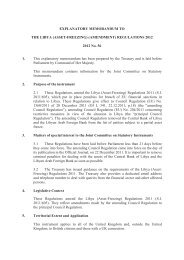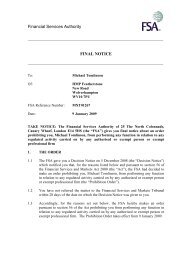FSA Annual Report 2006/07 - Better Regulation Ltd
FSA Annual Report 2006/07 - Better Regulation Ltd
FSA Annual Report 2006/07 - Better Regulation Ltd
You also want an ePaper? Increase the reach of your titles
YUMPU automatically turns print PDFs into web optimized ePapers that Google loves.
10<br />
Chief Executive’s report<br />
<strong>FSA</strong> <strong>Annual</strong> <strong>Report</strong> <strong>2006</strong>/<strong>07</strong><br />
Treating customers fairly<br />
Treating customers fairly is an<br />
important example of principlesbased<br />
regulation. We have set out<br />
six key outcomes for retail<br />
consumers which we want the<br />
industry to achieve. Our overall aim<br />
is that all firms treat their customers<br />
fairly in all parts of their business<br />
and throughout what we call the<br />
product life-cycle – product design,<br />
marketing and promotion, sales and<br />
advice, after-sales information, and<br />
complaints handling. We set out the<br />
targets we expected firms to reach<br />
by the end of March 20<strong>07</strong>. Progress<br />
towards these targets has been<br />
mixed, with over 90% of major<br />
retail firms meeting the deadline<br />
compared with just over 40% of<br />
smaller firms. We have been<br />
encouraged by the commitment of<br />
management to get to grips with the<br />
TCF principle, but the patchy<br />
performance in making real changes<br />
to the way they deal with customers<br />
shows that more effort from both<br />
the industry and us is still needed.<br />
One particularly complex area<br />
where we have made progress is in<br />
distinguishing between<br />
responsibilities to the end customer<br />
of product providers and<br />
distributors.<br />
Financial capability<br />
Helping consumers help themselves<br />
is a key part of our approach to<br />
helping retail consumers achieve a<br />
fair deal. In my first speech on<br />
becoming Chief Executive I<br />
announced that the <strong>FSA</strong> would<br />
establish and lead a National<br />
Strategy for Financial Capability.<br />
Since then, firm foundations have<br />
been laid and this year has produced<br />
a step change in delivery on the<br />
ground and seen us start to make a<br />
real impact in people’s lives. For<br />
example, our funding of the<br />
Personal Finance Education Group<br />
(pfeg) has enabled them to support<br />
over 600 schools through the<br />
Learning Money Matters<br />
programme, working with the grain<br />
of education, to provide schools<br />
with the resources and support they<br />
need to plan and teach personal<br />
finance education. We have<br />
distributed over 200,000 packs of<br />
educational material and delivered<br />
seminars to around 9,000 employees<br />
in workplaces across the country.<br />
Underpinning all of our consumer<br />
information is our consumer<br />
website, which we re-launched in<br />
January 20<strong>07</strong>.<br />
There is, of course, much more to<br />
do, but the momentum is with us<br />
and I am delighted that financial<br />
capability has become a public<br />
policy priority, both here in the UK<br />
and internationally. In this context,<br />
I welcome the publication in January<br />
of the government’s long-term<br />
approach to financial capability and,<br />
in particular, the leadership of Ed<br />
Balls on behalf of the government.<br />
The government also announced an<br />
independent feasibility study to<br />
deliver a national approach to<br />
generic financial advice. I believe the<br />
provision of generic money advice is<br />
a key missing component in helping<br />
consumers become more financially<br />
capable, and I am delighted that<br />
Otto Thoreson has been appointed<br />
by the government to do this work.<br />
I believe that lack of financial<br />
capability is a key challenge for<br />
society. To this end, we have<br />
increased our funding from £9.7m<br />
in 2005/06 to £17.1m in <strong>2006</strong>/<strong>07</strong><br />
and we plan to spend some £80m<br />
over the remaining four years of our<br />
current programme. It will take a<br />
generation for this initiative to take<br />
full effect, so the <strong>FSA</strong> and our<br />
partners are in this for the long<br />
haul. In doing so, we will build on<br />
what I believe has been a very<br />
promising start.<br />
Increasing transparency and<br />
efficiency in wholesale markets<br />
Whilst the external environment has<br />
remained relatively calm, we have<br />
been addressing a number of<br />
operational and structural issues<br />
which give rise to actual or potential<br />
market failures in wholesale<br />
markets. Where possible, we have<br />
used market solutions to effect<br />
change rather than adding new areas<br />
of rules to the Handbook, and there<br />
have been some notable successes in<br />
the last year.<br />
We have been working with the<br />
industry and the other major<br />
international regulators to improve<br />
back-office standards in<br />
confirmation practices (originally in<br />
credit derivatives but now across a<br />
wider range of derivatives markets).<br />
The industry has responded<br />
positively, agreeing to targets for the<br />
completion of relevant<br />
documentation, metrics to measure<br />
progress, and initiatives to improve<br />
documentation standards. As a<br />
result, the backlog of confirmations<br />
in credit derivatives has been<br />
reduced by 90%.<br />
Last year also saw the general<br />
insurance industry achieve the target<br />
I set in December 2004 for over<br />
85% of contracts to meet the<br />
market-endorsed contract certainty<br />
standard within two years. In fact<br />
the actual performance by December<br />
<strong>2006</strong> was well in excess of this<br />
target. The improved procedures<br />
and changed behaviours that<br />
support the market’s solution have<br />
reduced the risks and market<br />
inefficiency that insurers, brokers<br />
and insurance buyers had been<br />
exposed to. The drive to achieve<br />
contract certainty has also served as<br />
a catalyst for the ongoing wider<br />
reform of the industry and will<br />
further raise the competitiveness of<br />
the UK industry.









